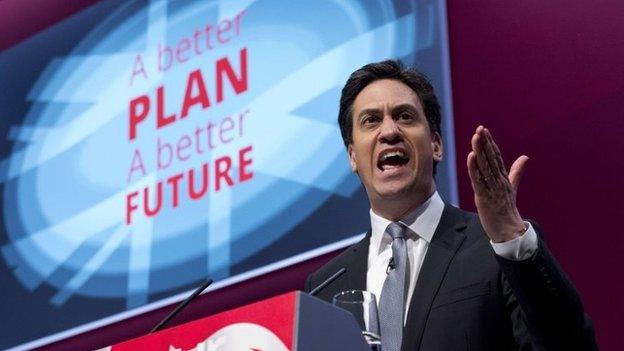Labour’s manifesto: Is he ready? Are they responsible?
- Published

Address the nation's doubts. Confront your weaknesses. Tackle them head on.
That seems to have been Ed Miliband's plan today as he made two key claims :
"I am ready"
and
"We are the party of responsibility"
He argued that he had been tested over the past four years and shown his strength in confronting the banks and the energy firms and Rupert Murdoch. Voters, he says, can now ask the question: "Who do you think will stand up to powerful interests?…The answer will never be David Cameron"
His "mission" as your prime minister would, he said, be simply summed up: "I will always stand up for you."
It was one of the most powerful speeches I've seen him make.
It was, though, the front page of the manifesto with its "Budget Responsibility Commitment" and "clear vow to protect our nation's finances" which revealed his greatest fear. How can he convince voters so soon after the Great Crash of 2008 to put Labour in charge of the economy again?
He promises a "triple lock ….everything in this manifesto is funded. The deficit will be cut every year. The books will be balanced and the national debt will be falling".
The language is new. The prominence it's being given is new too and a stark contrast with that last big speech Ed Miliband made in Manchester, at the Labour Party conference, when he "forgot the deficit". The content is not though.
Even under the triple lock Labour could borrow much more than the Tories (up to £39bn by 2020) and they are not committed to eliminating the deficit by the end of the next Parliament.
This is because Ed Balls treats investment spending different from day to day spending. Many economists would say this is very sensible but it is a lot less tough than George Osborne would be and, even, than the Liberal Democrats.
Every manifesto is a mix of the three Rs - Retail Offer, Radicalism and Reassurance.
Although this manifesto contains a clear retail offer with plenty of important policy promises - eg on the minimum wage and train fares and child care - it will be remembered for Ed Miliband's attempt to convince the country that he embodies both Radicalism and Reassurance.
If he succeeds he'll govern Britain for the next five years. In which case you and I ought to get familiar with what the rest of that manifesto says.
Update
To be clear, the Liberal Democrats agree with Labour that investment spending should be treated differently from day to day or current spending.
Where they differ from Labour is in setting a target of 2017 to balance the books as against aiming to do so by the end of the parliament.
It is the combination of excluding capital spending and the longer time frame which allows you to calculate that if he becomes Chancellor Ed Balls could, if he chose - and he might not - borrow up to £39bn more than George Osborne in five years times.
That's an awful lot of money and conveys a rather different impression to this morning's promise of "no more borrowing" to pay for manifesto promises.
Of course, Mr Balls hopes his policies will increase economic growth and reduce borrowing faster rather than slower than the Tories. As my colleague Robert Peston has blogged that too is a controversial claim.